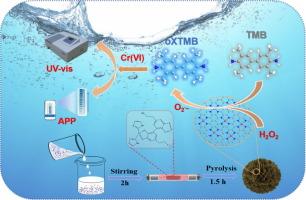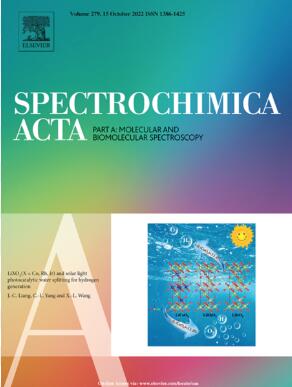Flower-like boron-doped zinc single-atom nanozymes for colorimetric sensing and smartphone-assisted detection of Cr(VI)
IF 4.3
2区 化学
Q1 SPECTROSCOPY
Spectrochimica Acta Part A: Molecular and Biomolecular Spectroscopy
Pub Date : 2024-10-22
DOI:10.1016/j.saa.2024.125328
引用次数: 0
Abstract
With the development of electronics, electroplating, printing, and dyeing industries, environmental pollution caused by hexavalent chromium (Cr(VI)) has become increasingly prominent. Skin contact with Cr (VI) can cause allergies or genetic defects, and inhalation can cause cancer, which is a lasting danger to the environment and the human body. Developing effective strategies to monitor Cr(VI) in environmental water or industrial wastewater can evaluate the degree of water pollution and risk warning, thus helping to prevent the spread of Cr(VI) pollution, promote the protection of water resources and the ecological environment, and ensure human safety and sustainable development. On the basis of the regulation of dopamine, boron-doped zinc single-atom nanozymes (Zn/B-NC SAzymes) with three-dimensional nanoflower morphology were controlled in this work. The introduction of B in Zn/B-NC SAzymes and the high metal loading of Zn (6.5 wt%) led to the formation of more active sites, resulting in the material showing excellent enzyme-like activity·H2O2 decomposed to generate superoxide radicals under the catalysis of Zn/B-NC SAzymes, which then oxidized the substrate 3,3′,5,5′-tetramethylbenzidine (TMB) to generate blue oxTMB. When Cr(VI) was introduced into the sensor system, the color of blue oxTMB is deepened, and the colorimetric method of Cr(VI) was constructed. The linear range is 0.2–40 μM, LOD is 59 nM, and the visual detection of Cr (VI) is performed with the aid of the smartphone. This work not only provides experimental and theoretical guidance for understanding the active centers of Zn-SAzymes and their catalytic processes, but also provides a promising and alternative detection strategy for the rapid and even visual on-site detection of Cr(VI) in aquatic environments, which is of great significance for the control of Cr(VI) pollution in the environment and industrial wastewater.

用于比色传感和智能手机辅助检测六价铬的花朵状掺硼锌单原子纳米分子。
随着电子、电镀、印染等行业的发展,六价铬(Cr(VI))造成的环境污染问题日益突出。皮肤接触六价铬会引起过敏或遗传缺陷,吸入六价铬会致癌,对环境和人体的危害是持久的。制定有效的环境水或工业废水中六价铬监测策略,可以对水污染程度进行评估和风险预警,从而有助于防止六价铬污染的扩散,促进水资源和生态环境的保护,保障人类安全和可持续发展。在调控多巴胺的基础上,本研究控制了具有三维纳米花形态的掺硼锌单原子纳米酶(Zn/B-NC SAzymes)。由于在 Zn/B-NC SAzymes 中引入了硼,且锌的金属负载量较高(6.5 wt%),因此形成了更多的活性位点,从而使该材料显示出卓越的酶样活性。在 Zn/B-NC SAzymes 的催化作用下,H2O2 分解产生超氧自由基,然后氧化底物 3,3',5,5'-四甲基联苯胺(TMB),生成蓝色的 oxTMB。当六价铬进入传感器系统时,蓝色 oxTMB 的颜色加深,从而构建了六价铬的比色法。其线性范围为 0.2-40 μM,LOD 为 59 nM,并可借助智能手机进行铬(VI)的目视检测。这项工作不仅为了解 Zn-SAzymes 的活性中心及其催化过程提供了实验和理论指导,而且为快速、甚至可视化地现场检测水生环境中的六(Cr)提供了一种前景广阔的替代检测策略,对控制环境和工业废水中的六(Cr)污染具有重要意义。
本文章由计算机程序翻译,如有差异,请以英文原文为准。
求助全文
约1分钟内获得全文
求助全文
来源期刊
CiteScore
8.40
自引率
11.40%
发文量
1364
审稿时长
40 days
期刊介绍:
Spectrochimica Acta, Part A: Molecular and Biomolecular Spectroscopy (SAA) is an interdisciplinary journal which spans from basic to applied aspects of optical spectroscopy in chemistry, medicine, biology, and materials science.
The journal publishes original scientific papers that feature high-quality spectroscopic data and analysis. From the broad range of optical spectroscopies, the emphasis is on electronic, vibrational or rotational spectra of molecules, rather than on spectroscopy based on magnetic moments.
Criteria for publication in SAA are novelty, uniqueness, and outstanding quality. Routine applications of spectroscopic techniques and computational methods are not appropriate.
Topics of particular interest of Spectrochimica Acta Part A include, but are not limited to:
Spectroscopy and dynamics of bioanalytical, biomedical, environmental, and atmospheric sciences,
Novel experimental techniques or instrumentation for molecular spectroscopy,
Novel theoretical and computational methods,
Novel applications in photochemistry and photobiology,
Novel interpretational approaches as well as advances in data analysis based on electronic or vibrational spectroscopy.

 求助内容:
求助内容: 应助结果提醒方式:
应助结果提醒方式:


